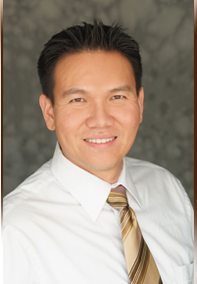
Education
Clinical Neurophysiology Fellow
Chief Neurology Resident
Neurology Residency
Internal Medicine Internship
Medical School
Biological Science Major
Board Certified: American Board of Psychiatry and Neurology Certificate # 54817 (June 2008)
Board Certified: American Board of Electrodiagnostic Medicine Certificate # 3392 (April 2009)
Board Certified: ABPN in the subspecialty of Clinical Neurophysiology Certificate #2000 (May 2009)
- American Academy of Neurology, member since 2004
- Advancing Neuromuscular, Musculoskeletal and Electrodiagnostic Medicine, member since 2007
- International Stroke and American Heart Association, member since 2007
Dr. Henry Tung Tang is a triple-board-certified and fellowship trained neurologist practicing in Simi Valley and Thousand Oaks of the Ventura County since 2008.
He is board certified in Neurology, Clinical Neurophysiology, and Electrodiagnostic Medicine. Dr. Tang was born in Hong Kong, but raised in Los Angeles.
Dr. Tang obtained his Bachelor of Science degree in Biology from University of California at Irvine, where he graduated with both Cum Laude and Biological Research Honors in 1998. The following year, he worked as a pharmaceutical analyst at Allergan Inc. in addition to doing research and teaching at Premier Academy for gifted high school students.
In 2003, he graduated medical school in the top 15% and with honors from Western University of Health Sciences. He completed his Internal Medicine Internship at UCSF-Fresno in 2004 and received the Hardest Working Resident Award.
In 2007, he completed his Neurology Residency training at Loma Linda University, where he was elected Chief Resident his final year and he was recognized as the Neurology Resident of the Year.
Dr. Tang remained at Loma Linda University for a fellowship and finished it in 2008. His fellowship was in Clinical Neurophysiology which included training in performing and interpreting nerve conduction studies and electromyography (NCS and EMG), electroencephalograms, (EEG) and brainstem auditory, visual and somatosensory evoked potentials (BAER, VER, SSEP). Dr. Tang enjoys practicing general neurology, performing and interpreting EMG/NCS and interpreting EEGs.
Dr. Tang was given the Outstanding Clinical Neurophysiology Fellow Award in 2008. He is a member of the Alpha Omega Alpha Honors Society, AAN, AANEM, and AHA/ASA.
Dr. Tang currently practices in the Simi Valley and Thousand Oaks area holding privileges at both Simi Valley Adventist Health and Los Robles Hospital in Thousand Oaks, California. He’s also the director for the Stroke Program at Simi Valley Adventis Health.
Aside from spending time with his wife and his three children, Dr. Tang’s interests include basketball, ping pong, sports, movies and traveling. He currently resides with his family in the Ventura County.
Research and Publications
- Case Presentation “Unusual Presentation of an Ulnar Neuropathy” AANEM Annual Meeting in Phoenix, AZ 2007
- Case Presentation “The Typical Complicated Epilepsy Patient at Loma Linda University Medical Center” Kiffin Penry Mini-Fellows Meeting in Greensboro, NC and AES Annual Meeting in Philadelphia, Penn 2007
- Blinded Investigator in Randomized Prospective, Multi-centered Double Blinded, Placebo Controlled Trial with Combinational Therapy of Copaxone and Prednisone in Multiple Sclerosis 2006
- Blinded Investigator in Rituximab Trial in MS 2006
- Tang T and Masterman D. 2001. The Effects of Donepezil on Neuropsychiatric Symptoms in Alzheimers Patients. Journal of Investigative Medicine., 49 (1) 14A
- Tang T and Masterman D. 2000. The Effects of Donepezil on Neuropsychiatric Symptoms in Alzheimers Patients. UCLA Project Reports Journal 2000 p. 128-143
- Tang T and Rinaldi P 1998. Characterization of Thalamic Neurons in Relation to Deafferentation and Chronic Pain. Journal of Undergraduate Research In the Biological Sciences, University of California, Irvine p 640-647
